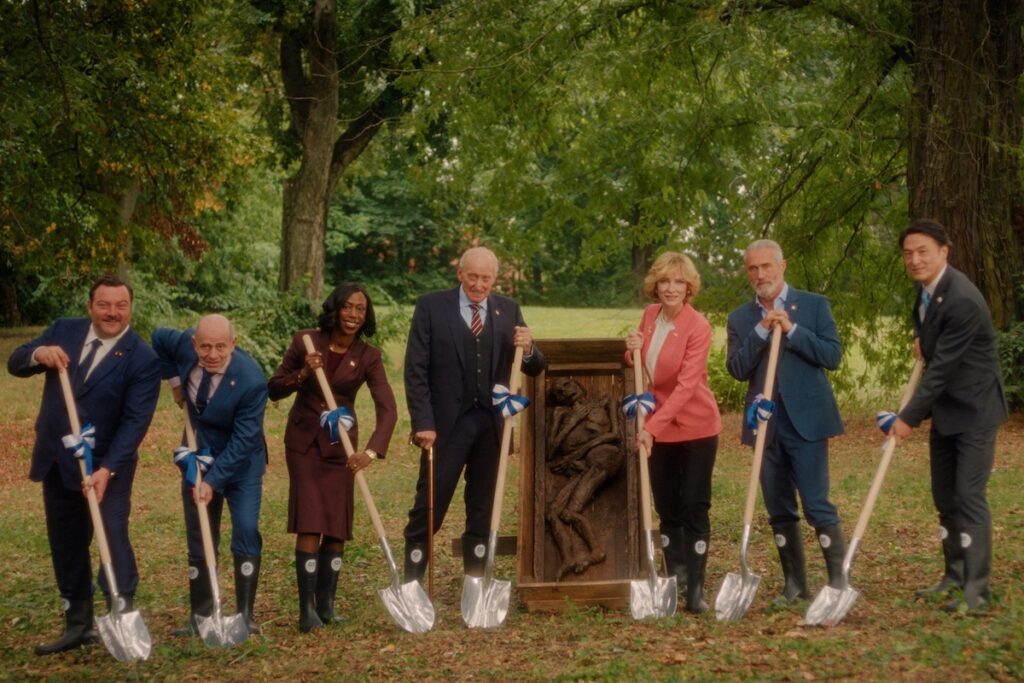Starring Cate Blanchett, ‘Rumours’ Hints at an Apocalypse in a World of Clueless Leaders
As the leaders make their way through a dark forest, hilarity, absurdity, and sincerity co-exist in a unique exploration of political ineptitude and end-of-times earnestness.

This year’s G7 summit took place in June at Fasano, Italy, and by all accounts – or at least the post-event press releases – it was another friendly and fruitful meeting of the minds among the leaders of the world’s wealthiest democracies. The new film “Rumours” imagines a different take on the annual event: at a remote estate in Germany, the seven “leaders of the free world” convene but are soon abandoned by their entourages and waitstaff after an unknown calamity occurs.
As the leaders make their way through a dark forest, hilarity, absurdity, and sincerity co-exist in a unique exploration of political ineptitude and end-of-times earnestness.
The movie begins with a blurb appearing on-screen explaining the G7, which is then followed up with a joke: “The producers would like to thank the G7 leaders for their support and consultation during the making of this film.” Those viewers familiar with director Guy Maddin’s pictures, and with his work with co-directors Evan and Galen Johnson, will immediately recognize the mock-serious tone. From the 1992 classic “Careful” to 2015’s “The Forbidden Room,” Mr. Maddin has long played with filmic conventions, genres, and storytelling techniques to present the world as ridiculous and fantastical.
Although “Rumours” looks fairly conventional in its opening scenes — when the seven heads-of-state greet each other while attendants and photographers swarm around them — Mr. Maddin’s humor still comes through. Cheesy bass and saxophone music plays as the British and Canadian prime ministers, portrayed respectively by Nikki Amuka-Bird and Roy Dupuis, discuss via double entendres an affair they had at the last summit. This scene is followed by one in which Cate Blanchett as the German chancellor shows her fellow officials a body recently excavated from a bog, an ancient man they learn may have been a chieftain killed for his incompetence.

During dinner at a lakeside gazebo, the clique discusses drafting a “provisional statement” in response to a “crisis,” though we’re never fully informed what the predicament entails. While buzzwords of bland politicking and mentions of minorities get bandied about, the actors and their characterizations amuse, especially those clearly inspired by their current and former real-life counterparts. Ms. Blanchett portrays an Angela Merkel type, Hilda, who’s all pragmatism and pant suits. Mr. Dupuis’s character, Maxime, is a fairly obvious stand-in for Justin Trudeau, sensitive and hunky but ineffectual and hapless. With the three directors being Canadian, Maxime and Canada come in for particular ribbing.
The great English actor Charles Dance seems to be channeling the elderly, out-of-it Joe Biden as President Wolcott, though the character does occasionally share some wisdom. His blatant British accent also provides the movie with one of its best evasive punchlines.
As the statesmen representing France, Japan, and Italy, actors Denis Ménochet, Takehiro Hira, and Rolando Ravello display stereotypical traits and resemble a few recent leaders of their respective countries, though one can’t help but feel the filmmakers missed out on a chance to cast a woman in the Italian premier role to comment on the trailblazing Giorgia Meloni. Beside the German chancellor, the only other woman in the septet is the sensible and competent British prime minister, Cardosa Dewindt, with Ms. Amuka-Bird exhibiting few Liz Truss characteristics.
Once the group discovers that they are alone with no cellphone service, and that reanimated bog people/”protestors” are stalking the woods, the movie becomes a cross between Luis Buñuel’s “The Discreet Charm of the Bourgeoisie,” a German folk tale, and “The Fellowship of the Ring.” Indeed, like that later film, there’s even an Enya song, this time inserted ironically. Yet in spite of their isolation, the narrative never segues into an outlandish version of “Lord of the Flies.” Even as they traipse through the night, the leaders remain focused on their “provisional statement” and courteous to each other throughout their predicament, which makes the humor all the sharper due to the actors playing it relatively straight and evenly keeled.
The steady satire diminishes only when a certain self-consciousness creeps in, as when the French president wonders aloud if the seven leaders are personifications of their nation’s tendencies. A subplot involving a big pink brain found on the forest floor and actress Alicia Vikander as the president of the European Commission intrigues, though it doesn’t really go anywhere either.
Several hot-button issues are brought up over the course of the entertainment, including immigration, AI, sexual predators, and government apologies for past offenses. The treatment of these topics lends the film an anti-political correctness tone that queasily connects with the intermittent nobleness of its characters.
This duality reaches its apogee during an uproarious finale when, as the apocalypse draws nearer, Maxime delivers a speech that’s alternately cynical and humanizing, over-the-top and inspiring. It’s an appropriately farcical culmination to the film’s story of world leaders having to get by not just on their belief in civilized society, but on their wits and survival skills — or lack thereof — as well.

